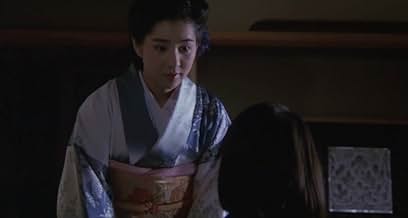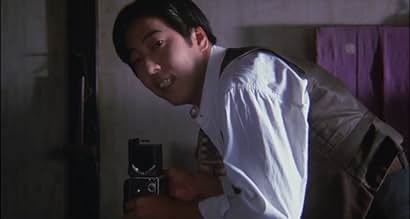IMDb RATING
7.2/10
1.9K
YOUR RATING
The orphaned Makioka sisters look for a husband for their third sister, Yukiko, as the rebellious youngest sister, Taeko, is kept waiting her turn.The orphaned Makioka sisters look for a husband for their third sister, Yukiko, as the rebellious youngest sister, Taeko, is kept waiting her turn.The orphaned Makioka sisters look for a husband for their third sister, Yukiko, as the rebellious youngest sister, Taeko, is kept waiting her turn.
- Awards
- 5 wins & 9 nominations total
Yonedanji Katsura
- Okuhata
- (as Kobeichô Katsura)
Michino Yokoyama
- Itani
- (as Michiyo Yokoyama)
Featured reviews
"Each sister is engaged in their own affairs, but Ichikawa's film (its Japanese title can be literally translated as "light snow") allots the lion's share to Sachiko and Yukiko, and the matchmaking arrangement preceded by precise calculation of all the conceivable conditions ("background" should be investigated through and through, no mentally disturbed mother-in-law lurking in the dark), the sheer canniness and the business-like action is astounding (death certificates of diseased wife and children are tossed over the dinner table), and Yukiko, played by beloved Japanese actress Yoshinaga with a comely reticence, extraordinarily wears down the mounting pressure and grinding process, to claim her hard-won victory, a good match is worth the wait, especially when eligible ones are few and far between during the wartime; whereas Sakuma, so adroitly embodies Sachiko's diligence and tenuous discomposure under a painstakingly maintained graciousness that comes naturally with age and savoir faire."
read my full review on my blog: cinema omnivore, thanks
read my full review on my blog: cinema omnivore, thanks
The Japanese movie entitled Sasameyuki (Light Snow) (1983) was shown in the U.S. with the title The Makioka Sisters. The film was based on a novel entitled The Makioka Sisters, so that change makes sense. The movie was co-written and directed by Kon Ichikawa.
The film takes place in the late 1930's, the years when Japan was a war with China. In retrospect, this was the start of WWII, but people didn't realize that at the time. There are some references to wartime scarcities, but this isn't a "homefront" movie.
The plot pivots on the marital status of the four sisters. Their parents are dead, and the oldest sister is responsible for the family name and the family honor. She's married, as is the second sister.
The third sister--Yukiko, portrayed by Sayuri Yoshinaga, is the shyest and most conservative of the four. The youngest sister--Taeko (Yûko Kotegawa) isn't as concerned about the strict rules of etiquette over which the others obsess. However, protocol dictates that she can't be married until Yukiko is married. So, much of the plot has to do with finding the right husband for Yukiko.
The film has colorful scenes of cherry blossoms and fall foliage. The glorious Japanese kimonos are worn by most women, and they are truly beautiful. (Because of the color and scenery, this movie would work better in a theater, but we had to make do with a DVD.)
Almost everything is serene on the surface of the film, but just under the surface there are intricate attachments and resentments. It's a long and quiet film, but it keeps your attention throughout.
For the record, Sayuri Yoshinaga (Yukiko) is one of Japan's greatest female actors. She starred in over 100 films. In my mind, she's the true star of this movie.
Some critics say that Ichikawa should be considered at the same level as the more famous Ozu, Kurosawa, and Mizoguchi. I don't have the depth of knowledge to know whether or not Ichikawa is the equal of the other three. However, after watching this movie, I know that he's a great director.
This film has an IMDb rating of 7.2, which is pretty good. I thought it was better than that, and rated it 9.
The film takes place in the late 1930's, the years when Japan was a war with China. In retrospect, this was the start of WWII, but people didn't realize that at the time. There are some references to wartime scarcities, but this isn't a "homefront" movie.
The plot pivots on the marital status of the four sisters. Their parents are dead, and the oldest sister is responsible for the family name and the family honor. She's married, as is the second sister.
The third sister--Yukiko, portrayed by Sayuri Yoshinaga, is the shyest and most conservative of the four. The youngest sister--Taeko (Yûko Kotegawa) isn't as concerned about the strict rules of etiquette over which the others obsess. However, protocol dictates that she can't be married until Yukiko is married. So, much of the plot has to do with finding the right husband for Yukiko.
The film has colorful scenes of cherry blossoms and fall foliage. The glorious Japanese kimonos are worn by most women, and they are truly beautiful. (Because of the color and scenery, this movie would work better in a theater, but we had to make do with a DVD.)
Almost everything is serene on the surface of the film, but just under the surface there are intricate attachments and resentments. It's a long and quiet film, but it keeps your attention throughout.
For the record, Sayuri Yoshinaga (Yukiko) is one of Japan's greatest female actors. She starred in over 100 films. In my mind, she's the true star of this movie.
Some critics say that Ichikawa should be considered at the same level as the more famous Ozu, Kurosawa, and Mizoguchi. I don't have the depth of knowledge to know whether or not Ichikawa is the equal of the other three. However, after watching this movie, I know that he's a great director.
This film has an IMDb rating of 7.2, which is pretty good. I thought it was better than that, and rated it 9.
One should first read The Makioka Sisters by Junichiro Tanizaki to better understand this film. It is a very great novel about the life of four middle-class sisters in Osaka, Japan in the 1930's. The book describes in great detail the many subtleties of life in Japan which a Westerner can miss understanding in the film. The film rather closely follows the book and is very beautifully photographed.
The Makioka Sisters shows Ichikawa going back to one of the greatest 20th Century Japanese writers, Junichiro Tanizaki. Ichikawa had already directed, in the 1950s, a stunning adaptation of the Tanizaki novel The Key. The Key is an elliptical comedy about erotic fixation, with a lush visual style of saturated colors. The Makioka Sisters is a more subtle and delicate film, attuned as the novel was to the undercurrents running through the highly structured lives of the main characters. In some ways, the novel was Tanizaki's attempt to write a modern version of Murasaki Shikibu's Tale of Genji, and Ichikawa seems to have understood this in his adaptation, which brings a great deal of low-key humor and psychological insight to the proceedings, all very much in the Genji style. Essential viewing.
We saw this beautiful movie several years ago at a Pacific Film Archive showing. We had read the book and found the film followed it faithfully and was gorgeously photographed. We just wish we knew if and when it will ever be made available on DVD or videotape. It was a pleasure to see a film that depicts life in nearly modern Japan with realistic people and locations. We have seen so many "studied" and arty films or medieval Japan that this one has remained a favorite ever since. We were pleased when a beautiful copy of "The Leopard" was released last year and hope that something this classic and beautiful can be made available to viewers.
Did you know
- TriviaThe story spans the period from autumn, 1936, to April, 1941, ending about seven months before the Japanese attack on Pearl Harbor. The novel references a number of contemporary events, such as the Kobe flood of 1938, the Second Sino-Japanese War, and the growing tensions in Europe.
- GoofsTaeko is clearly wearing a strapless bra when she's in the bathtub.
- ConnectionsReferenced in Dans un jardin qu'on dirait éternel (2018)
Details
- Release date
- Country of origin
- Language
- Also known as
- The Makioka Sisters
- Filming locations
- Production company
- See more company credits at IMDbPro
Contribute to this page
Suggest an edit or add missing content





























